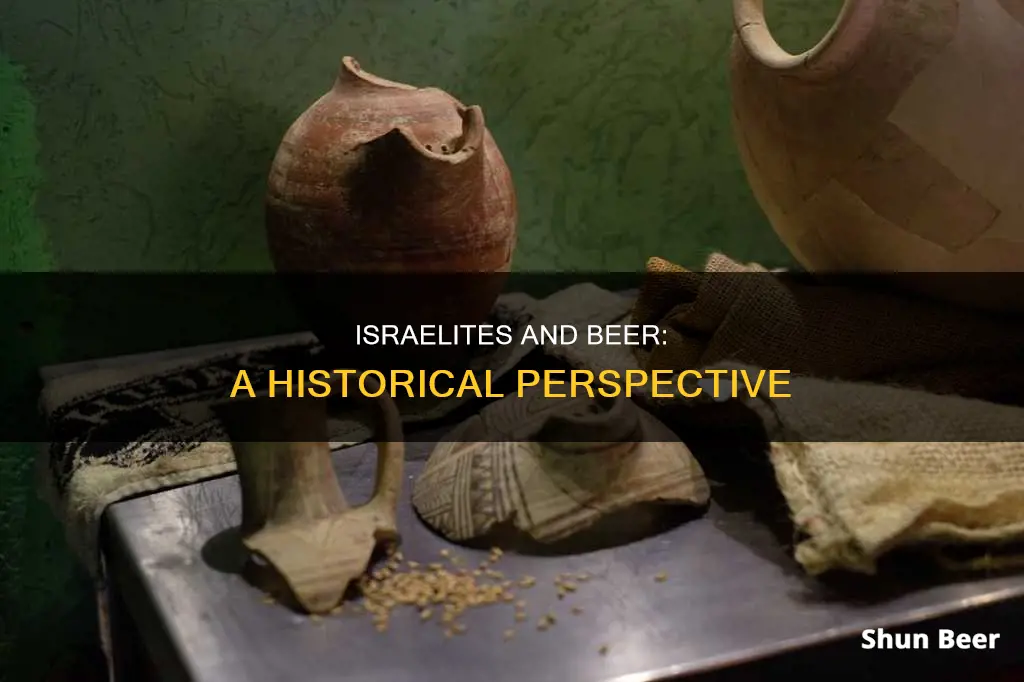
The consumption of beer in ancient Israel is a topic that has been widely debated. While some scholars argue that the ancient Israelites did drink beer, others disagree. The main reason for this debate is the absence of the word beer in the Bible. However, it is important to note that the Hebrew word shekhar, which appears in the Hebrew Bible, is believed by some to be derived from the Akkadian word šikaru, which refers to barley beer. Ancient Israelites, with the exception of Nazirites, consumed beer as a staple drink. Its consumption was encouraged, sanctioned, and linked to their religion. Beer was also used as a remedy for sadness (Proverbs 31:6). However, the Biblical authors also advocated for moderation, with several passages condemning excessive beer consumption (Isaiah 5:11, 28:7; Proverbs 20:1, 31:4).
| Characteristics | Values |
|---|---|
| Drinking Culture | Drinking was prevalent across the Ancient Middle East and a daily libation in the Ancient world |
| Beer Consumption | Ancient Israelites, including men, women, and children of all social classes, drank beer in large quantities |
| Religious Significance | Beer consumption was encouraged, sanctioned, and intimately linked with their religion |
| Religious Rituals | Yahweh, according to the Hebrew Bible, consumed beer through the cultic ritual of libation, and he drank more on the Sabbath (Numbers 28:7–10) |
| Beer as Comfort | People who were sad were advised to drink beer to temporarily forget their troubles (Proverbs 31:6) |
| Moderation | Biblical authors called for moderation, with several passages condemning excessive beer consumption (Isaiah 5:11, 24:9, 28:7; Proverbs 20:1, 31:4) |
| Beer as a Staple | Beer was a staple in the Israelite diet, just like in the rest of the ancient Near East |
| Beer in the Bible | The word "beer" rarely appears in the Bible, but the Hebrew word "shekhar" is believed to refer to beer |
| Archaeological Evidence | Iron Age sites in Israel have provided evidence of beer consumption, including beer jugs, bottles, straw-tip strainers, and fermentation stoppers |
| Chemical Analysis | Chemical analysis of traces of beer is more challenging than for wine due to shorter storage times, but it confirms beer consumption in ancient Israel |
What You'll Learn

Beer was drunk by all social classes
The importance of beer in ancient Israel is further emphasised by its mention in Proverbs 31:6, which advises people who are sad to drink beer to temporarily forget their troubles. However, the Biblical authors also called for moderation, with several passages condemning excessive consumption (Isaiah 5:11, 28:7; Proverbs 20:1, 31:4).
The drinking of beer was prevalent across the Ancient Middle East and was a daily libation in the ancient world. Beer was a staple drink throughout the region, and ancient historians know that beer was widely consumed due to the ease of growing grain. Beer was used as wages, and ancient physicians even recommended it for medicinal purposes.
The importance of beer in ancient Israel is further evidenced by archaeological findings. Iron Age sites in Israel have produced numerous remains, such as beer jugs, bottles, straw-tip strainers, and fermentation stoppers, which indicate the prevalence of beer drinking in ancient Israelite society.
Old Beer: Is It Safe to Drink After Years?
You may want to see also

The Hebrew word for beer
The exact meaning of the word "shekhar" is uncertain, and it has been the subject of debate among Bible scholars. Some scholars argue that it refers specifically to beer, while others claim that it is a general term for "intoxicant" or "intoxicating wine".
The word "shekhar" is formed from the root "shin, kaf, resh", which conveys the sense of drunkenness or inebriation. This root is also found in other Hebrew words related to alcohol and intoxication, such as shikaron and shikkur, meaning "drunkenness" and "drunk" respectively.
While the word "beer" is not explicitly mentioned in the Bible, the drinking of alcoholic beverages was prevalent in the Ancient Middle East, and ancient Israelites are known to have consumed alcohol regularly. The importance of understanding the ecological context of ancient Israel has been highlighted in this debate, as well as the potential bias among scholars towards wine consumption over beer drinking.
Old Beer: Is It Safe to Drink?
You may want to see also

Beer as a staple in the Israelite diet
Beer was a staple in the Israelite diet, just as it was throughout the ancient Near East. The drinking of beer was prevalent across the Ancient Middle East, and a daily libation in the Ancient world. The Hebrew Bible records barley, one of the main ingredients used in beer-making, as one of the most abundant and important crops of ancient Israel.
The consumption of beer in ancient Israel was encouraged, sanctioned, and intimately linked with their religion. Even Yahweh, according to the Hebrew Bible, consumed at least half a hin of beer (approximately 2 litres, or a six-pack) per day through the cultic ritual of libation, and he drank even more on the Sabbath (Numbers 28:7-10). People who were sad were advised to drink beer to temporarily forget their troubles (Proverbs 31:6). Biblical authors also called for moderation, with several passages condemning those who consumed too much beer (Isaiah 5:11, 28:7; Proverbs 20:1, 31:4).
The word "beer" is notably absent from most English translations of the Bible. This is likely due to confusion about the meaning of the Hebrew word "shekhar", a general snobbery in academia causing scholars to scorn beer drinking while celebrating wine culture, and the unique challenges archaeologists have faced in finding (or identifying) beer remains in the Israelite material record.
The process for making beer in ancient Israel was different from the one used today. It didn't include the addition of hops or carbonation. Beer was often produced by creating a bread or cake made from malted barley or wheat. The bread was then placed in water, forming a sweet liquid known as wort. After adding yeast, the carbohydrates would be converted to alcohol and carbon dioxide, which would cause the liquid to bubble, indicating fermentation. Thus, the wait from the time it was produced until consumption would have been only a few days. Moreover, beer did not keep well, so it was made for immediate consumption.
Freezing Beer: Is It Still Drinkable?
You may want to see also

Beer in religious rituals
Beer has played a role in religious rituals across various faiths and cultures.
Judaism
In Judaism, the Hebrew word "shekhar", derived from the Akkadian word "šikaru", is often translated as "strong drink" or "liquor", but it appears alongside "wine" in the Hebrew Bible, suggesting that it refers to beer. The consumption of shekhar is forbidden for Nazirites, who also have to pour it on the altar as a libation. While Jewish texts do not explicitly refer to fermented drinks, they acknowledge that alcohol can bring both relief and misfortune. Jewish law prohibits drunkenness and mandates the use of wine in various religious ceremonies, although non-alcoholic grape juice is often used instead.
Christianity
Christianity condemns the excess consumption of alcohol, although wine is used in sacraments like the Eucharist. Trappist monks are known for brewing beer, and some Christian denominations advocate for moderation in alcohol consumption, while others promote abstinence.
Islam
Islam prohibits the consumption and sale of alcohol for Muslims, viewing it as detrimental to spiritual and physical well-being. However, a minority of Muslims believe that alcohol consumption is not forbidden in the Quran.
Buddhism
Observant Buddhists avoid alcohol as it violates the fifth precept of the basic Buddhist code of ethics. However, some Buddhist tantric traditions, such as Vajrayana, include alcohol consumption as part of their rituals.
Hinduism
Hinduism does not have a central authority, but religious texts generally discourage alcohol consumption. While Brahmins are forbidden from drinking, the Kshatriya caste is allowed to consume alcohol in moderation, and the Manusmriti lays down specific rules for the Vaishya and Shudra castes.
Taoism
Taoism recommends abstaining from alcohol as it is believed to feed the "Three Worms" in the body that prevent one from finding the Way. However, some followers of Tao, including poets, painters, and musicians, have advocated for the controlled consumption of rice or millet beer.
Shinto
In Shinto, sake is consumed as part of purification rituals and to communicate with the gods. It is also shared among participants to foster friendship and strengthen community bonds.
Ancient Egyptian Religion
In ancient Egypt, beer and wine were offered to the gods and consumed during rituals and festivals. They were also buried with the mummified dead.
Ancient Greek Religion
The Cult of Dionysus and the Orphic mysteries incorporated wine into their religious practices, using it to reach ecstatic states during festivals and rituals.
Vodou
In the Vodou faith, rum is consumed to allow spirits called "lwa" to enter the body and provide strength and motivation to face everyday struggles.
Beer and the Bravo: A Perfect Match?
You may want to see also

Beer in the Bible
Beer was a staple in the Israelite diet, just as it was throughout the ancient Near East. The drinking of beer was prevalent across the Ancient Middle East, and a daily libation in the Ancient world. The Israelites, with the possible exception of a few teetotaling Nazirites and their mothers, proudly drank beer—and lots of it. Men, women and even children of all social classes drank it. Its consumption in ancient Israel was encouraged, sanctioned and intimately linked with their religion.
The Hebrew word "shekhar" is often translated as "strong drink" or "liquor" in English translations of the Old Testament. However, in the Hebrew Bible, the word appears 20 times in parallel with "wine" (e.g. wine and beer). In other ancient Near Eastern literature, the terms for wine and beer are often used in tandem. The word "shekhar" is derived from the Akkadian word "šikaru" which refers to "barley beer".
The importance of beer in ancient Israel can be seen in the fact that it was intimately linked with their religion. Even Yahweh, according to the Hebrew Bible, consumed at least half a hin of beer (approximately 2 litres, or a six-pack) per day through the cultic ritual of libation, and he drank even more on the Sabbath (Numbers 28:7-10). Beer was also used in rituals, as the Israelites were instructed to pour out beer as a drink offering to God (Numbers 28:7-10).
People who were sad were advised to drink beer to temporarily erase their troubles (Proverbs 31:6). The Biblical authors also called for moderation, with several passages condemning those who consumed too much beer (Isaiah 5:11, 28:7; Proverbs 20:1, 31:4). The absence of beer defines a melancholy situation, according to Isaiah 24:9.
The process for making beer in ancient Israel was different from that used today. It often involved creating a bread or cake made from malted barley or wheat, which was then placed in water to form a sweet liquid known as a wort. After adding yeast, the carbohydrates would be converted to alcohol and carbon dioxide, causing the liquid to bubble and ferment. Beer did not keep well and was made for immediate consumption.
Archaeological evidence of beer-making in ancient Israel has been hard to come by, as much of the equipment used in beer production was also used to make bread. However, recent discoveries at Iron Age sites in Israel have provided evidence of beer jugs and bottles, straw-tip strainers, and donut-shaped fermentation stoppers, all of which indicate that the ancient Israelites drank beer.
Drinking Beer and Driving: What's the Legal Limit?
You may want to see also
Frequently asked questions
Yes, the Israelites drank beer.
The evidence comes from textual, archaeological, and linguistic sources. Textual sources include the Hebrew Bible, where the word "shekhar" is used to refer to an alcoholic beverage. Archaeological evidence includes the discovery of beer jugs and bottles, straw-tip strainers, and fermentation stoppers at Iron Age sites in Israel. Linguistic evidence includes the derivation of the Hebrew word "shekhar" from the Akkadian word "šikaru", which means "barley beer".
Beer was consumed by men, women, and children of all social classes in ancient Israel. It was often drunk from a communal vessel using straws and was intimately linked with their religion.
Beer played an important role in ancient Israelite society. It was used to temporarily erase troubles and was also offered as a sacrifice to Yahweh through the cultic ritual of libation.
Beer was made by creating a bread or cake made from malted barley or wheat. This bread was then placed in water to form a sweet liquid called wort. After adding yeast, the carbohydrates were converted into alcohol and carbon dioxide, causing the liquid to bubble and indicate fermentation.







